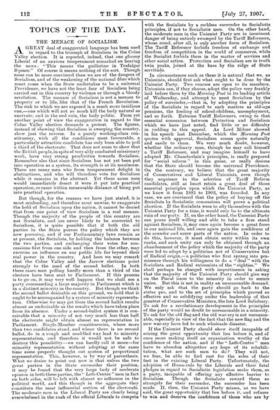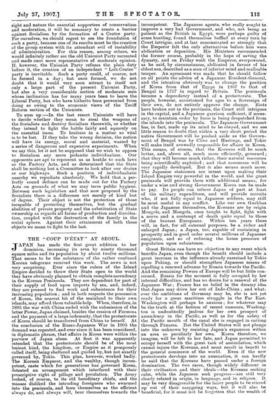TOPICS OF THE DAY.
THE MENACE OF SOCIALISM.
AGREAT deal of exaggerated language has been used in regard to the triumph of Socialism in the Colne Valley election. It is reported, indeed, that one gloomy Liberal of an anxious temperament remarked on hearing the news : "This means the guillotine in Trafalgar Square." Of course it means nothing of the sort. Though none can be more convinced than we are of the dangers of Socialism, and of the weakening of the national fibre which must come when the State undertakes to be a universal Providence, we have not the least fear of Socialism being carried out in this country by violence or through a bloody revolution. The menace of Socialism is not a menace to property or to life, like that of the French Revolution. The risk to which we are exposed is a much more insidious one,—one which will not so much kill the body natural as enervate, and in the end ruin, the body politic. From yet another point of view the exaggeration in regard to the Colne Valley election demands a protest. The figures, instead of showing that Socialism is sweeping the country, show just the reverse. In a purely working-class con- stituency, with all the conditions most favourable, a particularly attractive candidate has only been able to poll a third of the electorate. That does not seem to show that the British people, in spite of very ably conducted missionary work, have very strong proclivities towards Socialism. Remember also that since Socialism has not yet been put into operation as a system, its strength is at its maximum. There are many men who from temperament delight in abstractions, and who will therefore vote for Socialism while it remains in the abstract. Yet these same men would immediately desert it were it put into practical operation, or came within measurable distance of being put into praCtical operation.
But though, for the reasons we have just stated, it is most misleading, and therefore most unwise, to exaggerate the hold of Socialism upon the nation, it cannot be denied that from one point of view Socialism is a real menace. Though the majority of the people of this country are not Socialists, and are never likely to be converted to Socialism, it is quite possible that if both the old parties in the State pursue the policy which they are now pursuing, and if our Parliamentary laws remain as at present, the Socialists, by holding the balance between the two parties, and exchanging their votes for con- cessions first from one side and then from the other, may exercise an influence on our public life far beyond their real power in the country. And here we may remark that the Colne Valley and the Jarrow elections point strongly to the need of the second ballot. In both these cases men polling hardly more than a third of the electors have been sent to Parliament. If this process is to go on, it may very well happen that we shall see a party commanding a large majority in Parliament which is in a distinct minority in the country. But though we think the second ballot desirable on this ground, we hold that it ought to be accompanied by a system of minority representa- tion. Otherwise we may get from the second ballot results almost as undesirable as the results which have taken place from its absence. Under a second-ballot system it is con- ceivable that a minority of not very much less than half the electorate might obtain almost no representation in Parliament. Single-Member constituencies, where more than two candidates stand, and where there is no second ballot'do in a rough and muddled way lead to minority representation, and therefore it would not be safe to destroy this possibility—we can hardly call it more—for minority representation without adopting at the same time some properly thought out system of proportional representation. Tins, however, is by way of parenthesis. What we desire to point out now is that unless- the two great parties in the State reconsider their position, it may be found that the very large body of moderate opinion in both these parties, the" Left-Centre "men in fact on both sides, will be left with almost no influence in the political world, and this though in the aggregate they constitute the most influential seCtion of the electorafe. The moderate men in the Liberal Party are clearly being overwhelmed in the rush of the official Liberals to compete with the Socialists by a reckless surrender to Socialistic principles, if not to Socialistic men. On the other hand, the moderate men in the Unionist Party are in imminent danger of being entirely swamped by the Tariff Reformers, whose creed, after all, is only another form of Socialism. The Tariff Reformer forbids freedom of exchange and freedom of competition in the world of commerce, while the Socialist forbids them in the matter of services and other social action. Protection- and Socialism are in truth twin peaks, joined at the base by the ridge of State servitude.
In circumstances such as these it is natural that we, as Unionists, should first ask what ought to be done . by the Unionist Party. Two courses are open to its members. Unionists can, if they choose, adopt the policy very frankly laid before them by the Morning Post in its leading article of Wednesday, and attempt to meet Socialism by the policy of surrender,—that is, by adopting the principles of the Socialists in regard to such matters as old-age pensions, the feeding of school-children, unemployment, and so forth. Extreme Tariff Reformers, owing to that essential connexion between Protection and Socialism which We have just noted, find little or no difficulty in yielding to this appeal. As Lord Milner showed in his speech • last December, which the Morning Post quotes with approval, Socialism comes quite naturally and easily to them. 'We very much doubt, however, whether the ordinary. man, though lie may call himself a. Tariff Reformer, and may imagine himself to have adopted Mr. Chamberlain's principles, is really prepared for "social reform" in this guise, or really desires that the State should become the universal Providence. On the contrary, we believe that the great majority of Conservatives and Liberal Unionists, even though they acquiesce in the selection of Tariff Reform candidates, still at heart retain a great deal of those essential principles upon which the Unionist Party, as we knew it from 1885 to 1903, was founded. In any case, we are convinced that the policy of buying off the' Socialists by Socialistic concessions will prove a political abortion. If the Socialists were to ally themselves with the Unionist Party for a time, it would only be to the ultimate ruin of our party. If, on the other hand, the Unionist Party can prove itself willing and able to take a firm stand against Socialism, it, may once again become a great force in our national life, and once again gain the confidence of the sounder and saner parts of the nation. In order to do this, however, it must obtain unity within its own ranks, and such unity can only be obtained through an abandonment of the policy which the majority of the party were led to adopt by a, politician not of Conservative but of Radical origin,—a politician who first sprane, into pro- minence through his willingness to do a "deal" with the Socialists and Radical extremists of the "eighties." We shall perhaps be charged with impertinence in asking. that the majority of the Unionist Party should give way on the Fiscal issue to the minority in order to secure union. But this is not in reality an unreasonable demand. We only ask that the party should go back to the status quo, and to the set of principles which proved so effective and so solidifying under the leadership of that greatest of Conservative Ministers, the late Lord Salisbury. To ask for a revolutionary development in the principles of the party would no doubt be unreasonable in a minority. To ask for the old flag and the old war-cry is not unreason- able, especially in view of the fact that the new flag and the new war-cry have led to such wholesale disaster.
If the Unionist Party should show itself incapable of seizing the great opportunity that lies before it, and of once more making itself an organisation worthy of the confidence of the nation, and if the " Left-Centre " men have to abandon altogether any hope of its rehabili- tation, what are such men to do ? They will not, we fear, be able to find rest for the soles of their feet in the existing Liberal Party. .Unfortunately, the adoption of Home-rule by the Liberals and their fatal pledges in regard to Socialistic legislation make them, as a party, incapable of offering any effective barrier to Socialism. Though the Socialists reward them so strangely for their surrender, the surrender has been made. If, then, the Unionist Party misses, as we have said, the great opportunity that lies before it, and refuses to win and deserve the confidence of those who are by right and nature the essential supporters of conservatism and moderation, it will be necessary to create a barrier against Socialism by the 'formation of a Centre party. For ourselves, we should regret to see the foundation of such a party, because one of its results must be the creation of the group system with its attendant evil of instability of administration. For this reason, among others, we would infinitely rather see the old Unionist Party recreated and made once more representative of moderate opinion. If, however, the Unionist Party refuses the plain duty before it, the creation of an independent " Left-Centre ' party is inevitable. Such a party could, of course, not be formed in a day ; but once formed, we do not doubt that it would very soon attract to itself not only a. large part of the present Unionist Party, but also a very considerable section of moderate men whose inclination has for many years been to leave the Liberal Party, but who have hitherto been prevented from doing so owing to the economic views of the Tariff Reform section of the Unionists.
To sum up :—In the last resort Unionists will have to decide whether they mean to steal the weapons of the Socialists and destroy Socialism therewith, or whether they intend to fight the battle fairly and squarely on the essential issue. To hesitate in a matter so vital is to be lost. If they take the wrong decision, the nation will have its energy, moral and material, wasted by a series of dangerous and expensive experiments. When we say this, let it not be supposed that we wish to oppose to Socialism any mere pedantic individualism. Our opponents are apt to represent us as hostile to such laws as the Factory Acts, and as determined that the State shall be nothing but a Committee to look after our drains or our highways. Such a position of individualistic anarchy we repudiate absolutely. We hold that a per- fectly sound defence can be made out for the Factory Acts on grounds of what we may term public hygiene. Between such legislation and that now proposed by the Socialists there is a difference not merely of kind but of degree. Their object is not the protection of those incapable of protecting themselves, but the gradual abolition of private property and the substitution of State ownership as regards all forms of production and distribu- tion, coupled with the destruction of the family in the social sphere. Against their attainment of both these objects we mean to fight to the last.







































 Previous page
Previous page